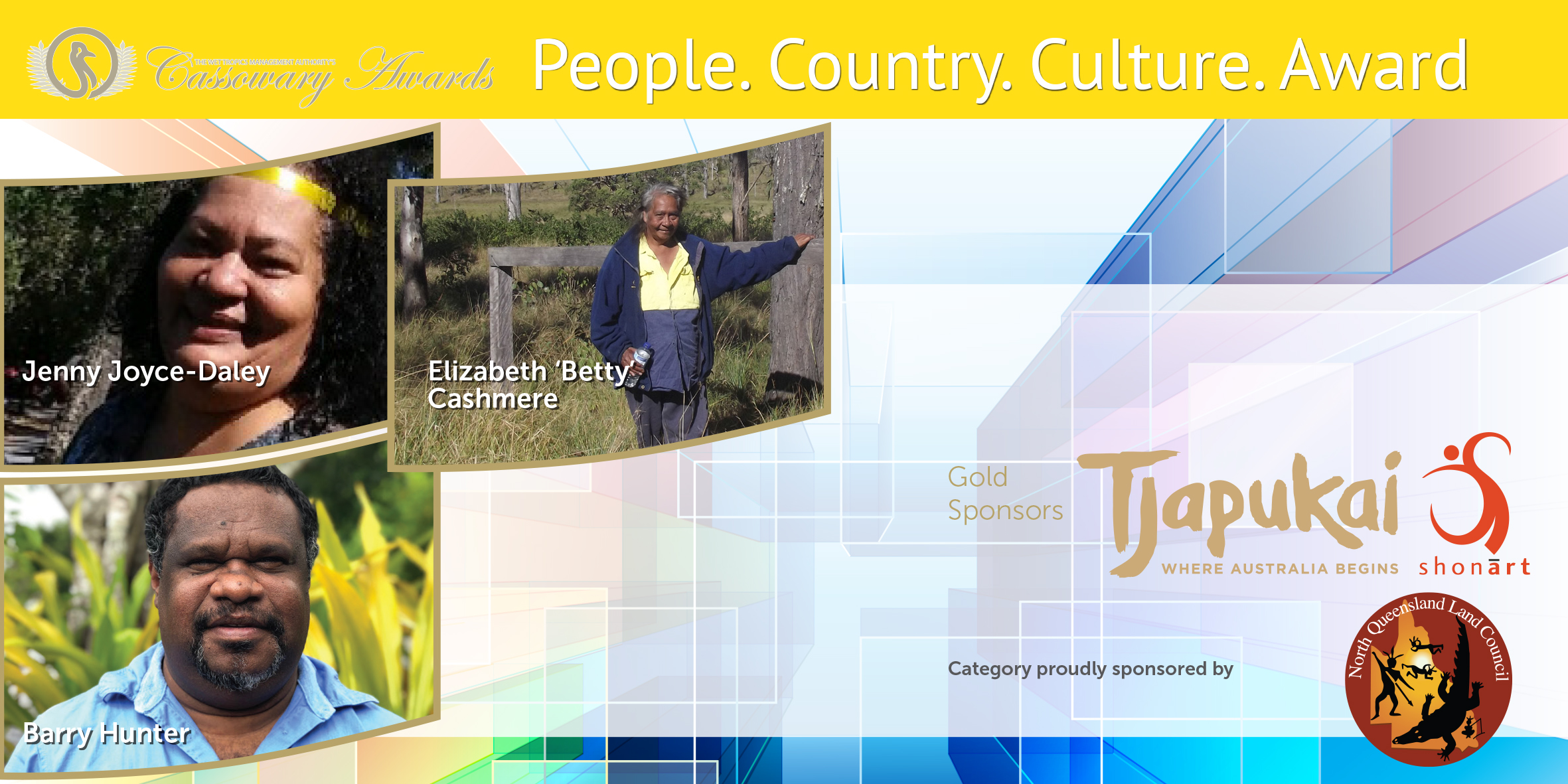
- Wet Tropics Management
- Legislative framework
- Management partnerships
- Sustainable Tourism Plan
- Threats to the Area
- Research and a Learning Landscape
- How can I help?
Long-term contributions by Rainforest Aboriginal People to the Wet Tropics World Heritage Area have been recognised with a number of nominations for the upcoming Cassowary Awards.
The Wet Tropics Management Authority today announced nominees for the People Country Culture Award, sponsored by North Queensland Land Council.
Award recipients will be announced at Tjapukai Aboriginal Cultural Park on 15 June.
Mamu Traditional Owner Jenny Joyce-Daley is nominated for her work in finding opportunities for youth on country and in communities, while ‘walking, talking encyclopaedia’ Elizabeth ‘Betty’ Cashmere is nominated for her part in passing Jirrbal cultural knowledge to the next generation.
Djabugay man and cultural leader Barry Hunter has worked in land management and cultural development for over 26 years, and is nominated for his role in working towards joint management of Din Din (Barron Gorge National Park).
Queensland’s Minister for Environment Leeanne Enoch congratulated all nominees and said it was great to see First Nations representatives nominated across a range of Cassowary Award categories.
‘The nominees in the People Country Culture category are leaders in their communities and the wider Wet Tropics region,’ Ms Enoch said.
‘First Nations people in the Wet Tropics have been caring for Country for thousands of generations, these nominations further demonstrate their invaluable contributions to the Wet Tropics in the areas of culture, conservation, community and innovation.
‘It’s wonderful to see this ongoing connection and commitment to Country recognised.’
The Djunbunji Land and Sea Program took a moral boost from its People Country Culture Award at the 2017 Cassowary Awards, says the program’s Executive Director Dale Mundraby.
‘To be nominated in the category was an honour, but to then take home this Cassowary Award was huge acknowledgement of the Mandingalbay Yidinji people in terms of how we operate and look after country,’ Mr Mundraby said.
‘The Cassowary Award was a health check that we’re on the right track. We want to share that journey with others and give inspiration and direction,’ he said.
Mr Mundraby congratulated all nominees, including those Rainforest Aboriginal groups nominated across other categories.
‘It is crucially important that we continue to recognise Rainforest Aboriginal People’s work in the Wet Tropics. Prior to contact Aboriginal people looked after, protected and managed the rainforest and that continues today.
‘Recognition gives us autonomy and identity, and that can only strengthened through partnerships and doing further work on country,’ he said.
Full details on nominees are listed below.

People Country Culture Award nominees—sponsored by North Queensland Land Council
Jenny Joyce-Daley
Mamu Traditional Owner Jenny Joyce-Daley is a passionate advocate in creating long-term and sustainable outcomes for all Mamu people. Jenny’s particular passion is creating a future for Mamu youth, providing opportunities to participate at all levels of community, as well as options to work on country and remain on traditional homeland estates rather than having to move away to find work. Jenny volunteers her time and knowledge, progressing many projects for the Mamu people by developing positive partnerships with a focus on inclusiveness.
Elizabeth ‘Betty’ Cashmere
Betty Cashmere has pushed strongly for the aspirations of the Jirrbal people on country. Currently working as cultural heritage officer for Wabubadda Aboriginal Corporation RNTBC, Betty has experience running a tour guide business on country, sat on the committee for the Regional Agreement and contributed to cultural heritage projects. Described as a ‘walking, talking encyclopaedia’ on Jirrbal country in the Wet Tropics World Heritage Area, Betty actively practises her cultural heritage and as a custodian is dedicated to protecting and caring for her country, ensuring cultural knowledge is passed onto the next generation.
Barry Hunter
Barry Hunter is a Djabugay man and cultural leader who has worked in land management and cultural development for over 26 years. Through his experience in a range of conservation planning processes including with Queensland Parks and Wildlife Service, Barry has fostered diverse networks across the community, the research sector, government and industry. Barry has taken a lead role in developing the Djabugay Bulmba Bama Plan to provide a path to joint management of the Din Din Barron Gorge National Park, ensuring genuine engagement with the Djabugay community throughout the process.